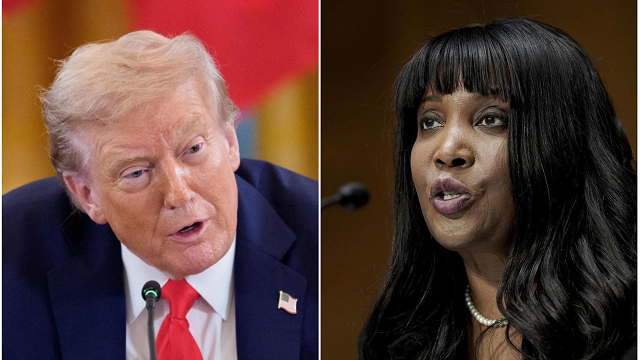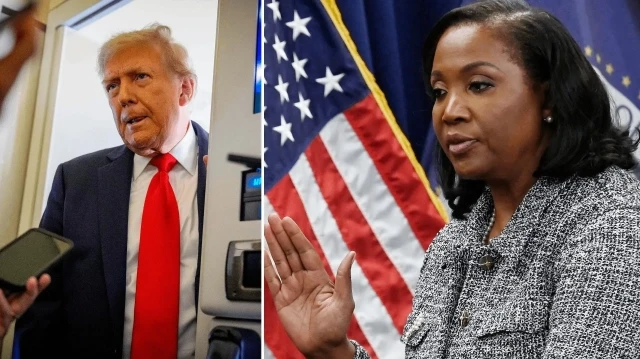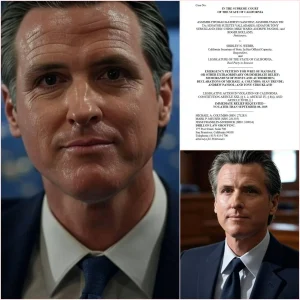In a stunning move that has sent shockwaves through Washington and Wall Street alike, President Donald Trump announced just moments ago the immediate dismissal of Federal Reserve Governor Lisa D. Cook. Citing allegations of mortgage fraud, a devastating loss of credibility, and an irreparable breach of public trust, Trump’s decision marks a dramatic escalation in his ongoing battle to reshape the nation’s central banking system. This isn’t just another political firing—it’s a potential powder keg that could ignite debates about corruption, economic stability, and the very foundations of American finance. As the dust settles, one can’t help but wonder: is this the beginning of a larger purge, or a desperate bid to deflect from broader economic woes?
The announcement came via a terse letter from the White House, dated August 25, 2025, and released to the public in the dead of night, ensuring maximum media frenzy by morning. Trump, never one to mince words, accused Cook of “deceitful and potentially criminal behavior” that undermines the integrity of the Federal Reserve. Sources close to the administration, speaking on condition of anonymity, revealed that the allegations stem from a recent investigation spearheaded by Attorney General Pam Bondi, which uncovered discrepancies in Cook’s personal financial dealings dating back years. While details remain murky—intentionally so, critics argue—the core claim revolves around mortgage documents that allegedly involved misrepresentation of assets or income, painting a picture of a high-ranking official who played fast and loose with the rules she was sworn to uphold.
Lisa D. Cook, appointed to the Fed Board in 2022 under the previous administration, has been a polarizing figure from the start. As the first Black woman to serve as a Fed governor, her tenure was hailed by some as a milestone for diversity in economic policymaking. But detractors, including prominent voices on the right, have long questioned her qualifications and decisions, particularly her dovish stance on interest rates amid persistent inflation. Trump’s move amplifies these criticisms, framing her dismissal not just as a personnel change but as a moral reckoning. “The American people deserve leaders they can trust,” the president’s statement read, “not ones entangled in fraud that erodes the very fabric of our economy.” This rhetoric is classic Trump—bold, unapologetic, and designed to rally his base while infuriating opponents.
Reactions poured in almost instantaneously, turning social media platforms like Threads into a virtual battlefield. Supporters cheered the decision as a long-overdue housecleaning, with hashtags like #DrainTheFed and #TrumpTakesAction trending within minutes. “Finally, someone holding these elites accountable!” one viral post exclaimed, garnering thousands of likes. On the flip side, critics decried it as an authoritarian overreach, pointing out that no president has ever successfully fired a Fed governor mid-term without congressional approval. Democratic leaders, including Representative Adam Schiff, blasted the move as “unprecedented and unconstitutional,” warning that it could destabilize global markets. Indeed, early trading indicators showed the dollar weakening slightly, with futures markets jittery about potential Fed independence erosion.
But let’s dive deeper into the allegations that sparked this firestorm. According to reports from Fox Business and other outlets, the mortgage fraud claims originated from a whistleblower tip, amplified by conservative activist Bill Pulte. Pulte, known for his real estate empire and vocal Trump support, alleged that Cook’s 2019 mortgage application contained falsified information, potentially violating federal laws. While Cook has vehemently denied these accusations, calling them “baseless smears,” the White House insists that an internal review found sufficient evidence to warrant removal. Skeptics argue this is thin gruel—mortgage discrepancies are common, they say, and weaponizing them against a political foe smacks of vendetta. Yet, in Trump’s America, where loyalty and perceived strength reign supreme, such distinctions may not matter.
The broader implications are staggering. The Federal Reserve, designed to be insulated from political pressures, now faces its most direct challenge since its inception in 1913. Trump’s action opens a new front in his fight for control over monetary policy, echoing his past clashes with former Fed Chair Jerome Powell. If successful, it could pave the way for more loyalist appointments, tilting the board toward aggressive rate cuts or other pro-growth measures favored by the administration. Economists are divided: some warn of hyperinflation risks if the Fed loses autonomy, while others applaud the potential for bolder action against lingering recession fears. “This could be the spark that crashes the economy—or saves it,” one analyst quipped on CNBC, capturing the high-stakes drama.
As the story unfolds, questions abound. Why now, just as the 2026 midterms loom? Is this tied to recent Fed decisions on interest rates, which Trump has publicly lambasted as “too high, too slow”? And what about Cook’s defenders, who highlight her academic credentials from Stanford and her research on racial disparities in economics? They argue this dismissal isn’t about fraud but about silencing diverse voices in a male-dominated field. The controversy has already spilled into cultural realms, with memes and Threads debates pitting economic expertise against political allegiance.
In the end, Trump’s dismissal of Lisa Cook isn’t just about one governor—it’s a referendum on trust in institutions. With allegations flying and markets watching, America holds its breath. Will legal challenges block the firing? Will Cook fight back with a lawsuit? Or will this fade into another chapter of Washington’s endless theater? One thing’s certain: in an era of divided politics, this scandal has the power to unite or fracture us further. Stay tuned—the fallout is just beginning, and the shocks keep coming.






